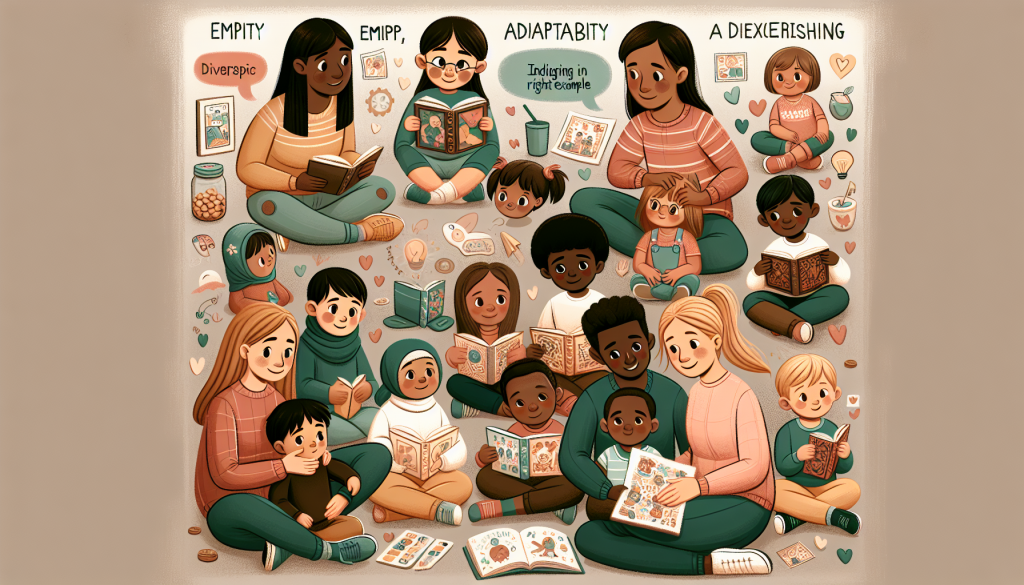“`html
Encouraging Children to Appreciate Diversity
Introduction
In today’s interconnected world, teaching children to appreciate diversity is more important than ever. As parents, we have the power to shape the way our children perceive and interact with people from different backgrounds, cultures, and life experiences. By fostering social awareness and empathy, we equip our children with the tools they need to thrive in a diverse society and build meaningful relationships.
This article will explore the significance of teaching children to value diversity, provide insights into how diversity fosters emotional resilience and problem-solving skills, and offer practical parenting strategies to encourage acceptance and understanding. Let’s dive into how you can nurture these essential traits in your children.
Why Is Appreciating Diversity Important for Children?
Exposing children to diversity early in life has far-reaching benefits. Research shows that children who grow up in inclusive environments tend to be more empathetic, adaptable, and socially aware. These qualities not only enhance their personal relationships but also prepare them for success in a multicultural workforce and society.
According to principles of cognitive-behavioral therapy (CBT), understanding and accepting differences in others can address key psychological needs, such as the need for self-expression and autonomy. When children feel safe to express themselves and respect different perspectives, they build self-confidence and emotional intelligence.
How Diversity Builds Social Awareness and Emotional Growth
1. Developing Empathy
Appreciating diversity helps children put themselves in others’ shoes. Whether it’s understanding a friend’s unique cultural traditions or supporting a peer with different abilities, children learn to approach differences with kindness and curiosity.
2. Strengthening Problem-Solving Skills
When children interact with peers from diverse backgrounds, they encounter new ideas and perspectives. This fosters creativity and critical thinking, as they learn to navigate challenges with open-mindedness and flexibility.
3. Building Resilience
Exposure to diversity can also help children develop resilience. When they see others overcoming challenges or thriving in different conditions, it inspires them to adapt to their own difficulties with courage and determination.
Practical Parenting Strategies to Encourage Diversity Appreciation
As a parent, you play a key role in shaping your child’s attitudes and behaviors. Here are some actionable tips to help your child embrace diversity and develop social awareness.
1. Lead by Example
- Model inclusive language and behavior in your daily interactions.
- Demonstrate respect for people from all walks of life, whether it’s through conversations or actions.
- Share stories about your own experiences with diversity and what you’ve learned from them.
2. Introduce Diverse Books and Media
- Choose books, movies, and shows that feature characters from a variety of cultures, abilities, and backgrounds.
- Discuss the themes and lessons from these stories with your child to deepen their understanding.
- Make use of resources that celebrate diversity to create a positive narrative around differences.
3. Celebrate Cultural Traditions
- Encourage your child to learn about other cultures by participating in festivals, trying different cuisines, or attending community events.
- Teach them to appreciate the value of traditions and how they shape identities.
4. Encourage Open Conversations
- Be open to answering your child’s questions about race, gender, religion, or other differences.
- Let them express their thoughts and feelings, and guide them toward understanding and acceptance.
5. Foster Friendships Across Differences
- Support your child in building friendships with peers from various backgrounds.
- Encourage them to appreciate the unique qualities that each friend brings to the relationship.
Conclusion
Teaching children to appreciate diversity is an ongoing journey, but the rewards are immeasurable. By fostering social awareness, empathy, and adaptability in your child, you’re helping them grow into kind, understanding, and resilient individuals.
Remember, parenting strategies that emphasize the value of diversity not only enrich your child’s life but also contribute to a more inclusive and harmonious society. Start today by modeling acceptance, celebrating differences, and encouraging meaningful conversations.
For more parenting tips and resources on fostering emotional and social development in children, explore our Child Mind blog.
“`

